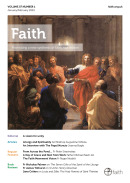A day of grace
At their November meeting, the bishops of England and Wales decided to postpone the reintroduction of Sunday as a day of obligation for the faithful. They recognised that many are returning to the churches and are, indeed, longing to be in the presence of Christ and to receive the Blessed Sacrament. There are others, however, who are still wary of returning and are preferring to participate from home and to make their spiritual communion, with help from the technology that makes this possible.
In these extraordinary times, church leaders will have to make prudential judgements of this kind, but it is good that churches are open and that people are coming to pray, to attend Mass and to receive communion, even if many look forward to the restoration of Holy Communion under both species, if only by intinction to begin with.
We should not, however, be allowed to forget the importance of gathering for worship and the centrality of meeting on a Sunday, which goes back to the New Testament itself and to the universal practice of the early Church. Already in the Acts of the Apostles, the earliest believers, we are told, “Devoted themselves to the Apostles’ teaching and fellowship, to the breaking of bread and the prayers” (Acts2:42). Such gathering makes the Church visible as the Body of Christ. The Letter to the Hebrews also warns us not to neglect coming together so that we can strengthen each other’s faith and to encourage one another in works of charity (Heb10:25).
Saint Paul
It seems clear that the main gatherings of this kind were already taking place on Sunday, that is, the first day of the week. Thus we are told that St Paul and his apostolic team were gathered together with the believers of Troas in Asia Minor for a celebration of the Eucharist and to hear the Word of God on the first day of the week (Acts 20:7). In his instruction to the Corinthian Christians about almsgiving, he tells them to set something aside for the Church at Jerusalem on the first day of every week (1 Cor16:2). The seer in the last book of the Bible tells us that as an exile on the island of Patmos, because of his witnessing to Jesus, he was in the Spirit on the Lord’s Day (η Κυριακή ημέρα- Apoc1: 10).
In the very early Didache, or Teaching of the Twelve Apostles, perhaps contemporaneous with the New Testament, we are told that the gathering together to break bread and to ‘eucharistise’ should take place on the Lord’s Day (14:1). The Letters of Ignatius (martyred c. 108 AD) explicitly replace the Jewish Sabbath with the Sunday because of its association with the Resurrection of Christ which brings us new life (Epistle to the Magnesians 9:1). Though the much later Syrian Apostolic Constitutions (4th century) tell Christians to observe both the Sabbath and the Lord’s Day! The former because of Creation and the latter on account of the Resurrection. Even slaves are to be allowed to rest and to worship on those two days. Have we here the first glimmerings of the five-day week and a concern for the welfare of the weakest which was to become such a feature of later Christian thought about the Lord’s Day?
The Church
Justin Martyr, who wrote his First Apology, that is, Defence of the Christian Faith, to the Roman Emperor in around 150 AD gives us a detailed account of how the President presides at a celebration of the Eucharist on the Sunday because that is the day that Creation was begun and the new Creation inaugurated by the rising again of Jesus Christ from the dead. The ‘memoirs’ of the Apostles and the writings of the prophets are read. When the reader has finished, the President preaches and this is followed by the prayers of the people. After this, bread, wine and water are brought to him and he offers up prayers and thanksgivings. Everyone then receives communion and the deacon takes the consecrated elements to those unable to be present. The offerings of the people are deposited with the President who uses them for relief of the poor, assistance for strangers and the ransoming of captives. He is described as the protector of those in need. Such is our continuity in faith, that we can recognise in Justin’s description of worship our own practice in the 21st Century!
After the recognition of Christianity as a religio licita from the time of Constantine, both civil and ecclesiastical laws stipulated that Sunday was a special day and, on the model of the Jewish Sabbath, made it a day of rest from most kinds of work. In England, this was reinforced by kings like Alfred the Great (9th century).
Following the Reformation, the observance of the Lord’s Day became more and more identified with the Sabbath and the Puritan Commonwealth imposed a rigorous understanding of it. This was relaxed a little after the Restoration but an Act of 1677 prohibited ‘worldly labour’ on Sundays. A period of laxness in the 18th century was followed by the Evangelical Revival and the return of a stricter discipline which characterised the 19th century.
The Catechism
The Catechism of the Catholic Church also sees Sunday as replacing the Jewish Sabbath because it is the day the new Creation was inaugurated by the Resurrection of the Lord. The faithful are exhorted to refrain from engaging in work or activities that may hinder worship, the appropriate relaxation of mind and body, attending to family needs or works of mercy. Because the Sunday Eucharist is ‘the foundation and confirmation of all Christian practice,’ the faithful are required to attend Mass unless there is a serious reason for being absent. By the way, such a requirement can protect us if we are required by employers to work so that we cannot access divine worship on a Sunday. Employment tribunals, for instance, will more easily see the need for ‘reasonable accommodation’ at the workplace if Sunday worship is an obligation rather than just a preference.
The Catechism also teaches that a weekly day of rest is a social good in that it provides for everyone to enjoy adequate rest, to cultivate family life and to engage in cultural and social activities that do not affect freedom for Christians to worship in tranquility and with reverence (why oh why do Sunday sport and boot sales have to take place at the very time when most Christians are worshipping?). These are some of the reasons why public authorities should make provision for Sunday rest and employers should respect its observance.
In common with much of the Christian consensus in the West, so-called ‘economic deregulation’ in Britain has also jeopardised the observing of the traditional Sunday: it is now shopping seven days a week, with only a fig leaf of a reduction in the hours and locations where people can shop. Although assurances were given that workers would not be compelled to work on Sundays, this has been widely ignored and, I understand, there is now no legal protection at all for Sunday as a common day of rest and recreation.
Against this, the Church continues to insist on the importance of Sunday not only for its own faithful but for the good of society as a whole.
Those of us who opposed the ‘liberalisation’ of the Sunday trading laws, foresaw that this would disproportionately affect the poorer and less skilled sections of society because of their weaker bargaining power, while allowing the professional classes to retain their customary privileges, including, of course, having the weekend off work. This is, indeed, what has happened.
Our heritage
Britain’s Christian heritage should alert us to what is needed for social cohesion and wellbeing. We need a common day of rest. It is not enough to ensure that people have days off in the week if these are unrelated to other members of the family or to their friends. If families are to be together for shared meals, leisure activities and, hopefully worship, they need a common day off. If friends are to meet and have adequate time together, there needs to be a common day when they can have such time together. Even if there was no religious reason for Sunday as a shared day of rest, there would still be plenty of social reasons for it. This may be why one of those politicians who led the drive for deregulating Sunday confessed to me that it was the worst mistake of his political life!
A gift
The biblical notion of Sabbath rest is one of the gifts of the people of Israel not only to the Church but to the world. In the form of the Christian Sunday, it has rescued millions from the drudgery and hardship of daily labour for at least one day and week. It has provided many with time to be with their family, to acquire literacy and other skills necessary for self improvement. It has encouraged the worship of God ‘in the beauty of holiness.’ Let us be grateful for the gift and let us not squander it for endless shopping or entertainment.






